Disability Project
Welcome to our Disabilities Digital Archive, a project conducted as part of Arab and Muslim Women’s Research and Resource Institute’s vision to create data and oral histories regarding women’s experiences and transform them into meaningful information. To that end, this project seeks to explore gendered disability and facilitate more complex understandings of disability at the intersection of gender, culture, immigration, and other forms of identity. By collecting data from Muslim community members in Milwaukee, including people with differences of ability and their families, caregivers, Imams and religious scholars, community organization leaders, and health care/mental health professionals, we strive to present a fuller picture to break down stigma and increase access to resources for people with differences of ability.
For more information, see:
https://amwrri.org/cms/files/original/2ba437efd3918c47316fdb8551d283523b1d1aaf.pdf
2022 Conference: Disability at the Intersection of History, Culture, Religion, Gender, and Health
This conference aims to encourage open discussion and better understanding as well as to breakdown stigma associated with disabilities. We invite papers that offer critical analysis of how disabilities have been viewed in historical terms as medical conditions, social/cultural constructs, and as the norms that produce and reproduce perceptions of normalcy or normative bodies.
For more information, click below:
https://epublications.marquette.edu/icdi/2022/
-
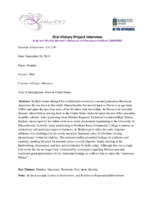 Interview Ibrahim (name changed for confidential reasons) is a second generation Moroccan American. He was born in Haverhill, Massachusetts, but moved back to Morocco at age three (2002) and spent the next four years of his life there with his brother. In Morocco he attended Quranic school before moving back to the United States where he spent the rest of his education in public schools. After graduating from Whittier Regional Technical Vocational High School, Ibrahim, encouraged by his father went on to study mechanical engineering at the University of Massachusetts (Lowell). Later transferring to Northern Essex Community College to pursue an exclusively self-motivated major in business. As Ibrahim grew older, his early religious influence was challenged by his newly accepted American sense of rebellion, forcing inconsistency within his identity. This internal conflict promoted feelings of confusion and curiosity, pushing the need for research across several religions, finally arriving at the hardworking, determined, and free-spirited identity he holds today. Although this was a tough time in his life, he no longer feels victimized by stereotypes regarding Muslim men and expressed great appreciation for his American heritage as it allows him to chase the “American Dream”.
Interview Ibrahim (name changed for confidential reasons) is a second generation Moroccan American. He was born in Haverhill, Massachusetts, but moved back to Morocco at age three (2002) and spent the next four years of his life there with his brother. In Morocco he attended Quranic school before moving back to the United States where he spent the rest of his education in public schools. After graduating from Whittier Regional Technical Vocational High School, Ibrahim, encouraged by his father went on to study mechanical engineering at the University of Massachusetts (Lowell). Later transferring to Northern Essex Community College to pursue an exclusively self-motivated major in business. As Ibrahim grew older, his early religious influence was challenged by his newly accepted American sense of rebellion, forcing inconsistency within his identity. This internal conflict promoted feelings of confusion and curiosity, pushing the need for research across several religions, finally arriving at the hardworking, determined, and free-spirited identity he holds today. Although this was a tough time in his life, he no longer feels victimized by stereotypes regarding Muslim men and expressed great appreciation for his American heritage as it allows him to chase the “American Dream”. -
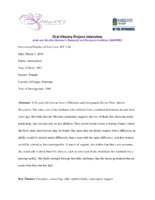 Interview A 62-year-old woman born in Palestine and immigrated first to Ohio, then to Wisconsin. She takes care of her husband who suffered from a subdural hematoma around three years ago. She feels like her Muslim community supports the two of them, but when she really needs help, she can only rely on her children. They attend social events at Sakina Center, where she feels more interviewees may be found. She states that she thinks women with a difference in ability would be treated much differently than a man with the same difference, and that women would be viewed as less marriageable. In terms of support, she wishes that there was someone she could talk to about hard life choices, such as when and if she should put her husband into a nursing facility. She finds strength through her faith and hopes that the future generation has an easier time than she has had.
Interview A 62-year-old woman born in Palestine and immigrated first to Ohio, then to Wisconsin. She takes care of her husband who suffered from a subdural hematoma around three years ago. She feels like her Muslim community supports the two of them, but when she really needs help, she can only rely on her children. They attend social events at Sakina Center, where she feels more interviewees may be found. She states that she thinks women with a difference in ability would be treated much differently than a man with the same difference, and that women would be viewed as less marriageable. In terms of support, she wishes that there was someone she could talk to about hard life choices, such as when and if she should put her husband into a nursing facility. She finds strength through her faith and hopes that the future generation has an easier time than she has had. -
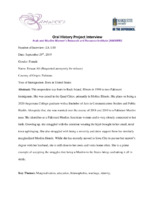 Interview This respondent was born in Rock Island, Illinois in 1998 to two Pakistani immigrants. She was raised in the Quad Cities, primarily in Moline Illinois. She plans on being a 2020 Augustana College graduate with a Bachelor of Arts in Communication Studies and Public Health. Alongside that, she was married over the course of 2018 and 2019 to a Pakistani Muslim man. She identifies as a Pakistani Muslim American woman and is very closely connected to her faith. Growing up, she struggled with the attention wearing the hijab brought in her small, rural town upbringing. She also struggled with being a minority and drew support from her similarly marginalized Muslim friends. While she has recently moved to Iowa City to pursue her master’s degree with her husband, she is still close to her roots and visits home often. She is a prime example of accepting the struggles that being a Muslim in the States brings and taking it all in stride.
Interview This respondent was born in Rock Island, Illinois in 1998 to two Pakistani immigrants. She was raised in the Quad Cities, primarily in Moline Illinois. She plans on being a 2020 Augustana College graduate with a Bachelor of Arts in Communication Studies and Public Health. Alongside that, she was married over the course of 2018 and 2019 to a Pakistani Muslim man. She identifies as a Pakistani Muslim American woman and is very closely connected to her faith. Growing up, she struggled with the attention wearing the hijab brought in her small, rural town upbringing. She also struggled with being a minority and drew support from her similarly marginalized Muslim friends. While she has recently moved to Iowa City to pursue her master’s degree with her husband, she is still close to her roots and visits home often. She is a prime example of accepting the struggles that being a Muslim in the States brings and taking it all in stride. -
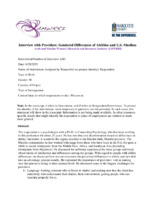 Interview The respondent is a psychologist with a Ph.D. in Counseling Psychology who has been working in this profession for about 25 years. He has not observed discrimination based on differences in ability, but rather, it would be the stigma attached to the Muslim faith, Muslim practices. The Muslim communities he has worked with range from those who have been in the U.S. for quite a while to recent immigrants from the Middle East, Africa, and Southeast Asia (including immigrants from Myanmar). He discussed the suffering experienced by these groups and made observations of similarities and differences among the groups. With regard to people with ability differences, he discussed how we can overcome the perceived differences in ability and turn that into an advantage, interpersonally. He explained the importance of providers’ role in making sure that person is living to their optimal level. He discussed some of the biggest challenges for providers: 1) Language. Getting someone who is fluent in Arabic and making sure that the client has somebody who understands their dialect, their conversation; getting people who can translate properly for us. 2) Transportation. Many of our clients, including those with ability differences, need transportation so they can have access to medical services. In terms of additional support or changes in attitude that are needed, the respondent replied that he would start with education. “…if folks who have been educating, formulating the brains of new providers in the field, firing up the engine of excitement to serve, and really seeing that those who come to serve — whether they are journalists or social workers, doctors, nurses, translators, whatever profession that person is bringing to the table — they are bringing up the motivation to serve the person regardless of their background. Regardless of the prejudices that may be there. And most importantly for the provider to understand their own biases and make sure they are not a part, and do not linger in service delivery.” Secondly, creating opportunity. “Creating opportunity for those that may be disadvantaged but deserve the chance to be heard, to express themselves, as we know that folks who have differences in abilities end up having barriers to access. Access to care, but also access to having a chance in life.”
Interview The respondent is a psychologist with a Ph.D. in Counseling Psychology who has been working in this profession for about 25 years. He has not observed discrimination based on differences in ability, but rather, it would be the stigma attached to the Muslim faith, Muslim practices. The Muslim communities he has worked with range from those who have been in the U.S. for quite a while to recent immigrants from the Middle East, Africa, and Southeast Asia (including immigrants from Myanmar). He discussed the suffering experienced by these groups and made observations of similarities and differences among the groups. With regard to people with ability differences, he discussed how we can overcome the perceived differences in ability and turn that into an advantage, interpersonally. He explained the importance of providers’ role in making sure that person is living to their optimal level. He discussed some of the biggest challenges for providers: 1) Language. Getting someone who is fluent in Arabic and making sure that the client has somebody who understands their dialect, their conversation; getting people who can translate properly for us. 2) Transportation. Many of our clients, including those with ability differences, need transportation so they can have access to medical services. In terms of additional support or changes in attitude that are needed, the respondent replied that he would start with education. “…if folks who have been educating, formulating the brains of new providers in the field, firing up the engine of excitement to serve, and really seeing that those who come to serve — whether they are journalists or social workers, doctors, nurses, translators, whatever profession that person is bringing to the table — they are bringing up the motivation to serve the person regardless of their background. Regardless of the prejudices that may be there. And most importantly for the provider to understand their own biases and make sure they are not a part, and do not linger in service delivery.” Secondly, creating opportunity. “Creating opportunity for those that may be disadvantaged but deserve the chance to be heard, to express themselves, as we know that folks who have differences in abilities end up having barriers to access. Access to care, but also access to having a chance in life.” -
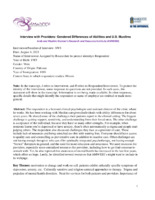 Interview The respondent is a licensed clinical psychologist and assistant director of the clinic where he works. He has been working with Muslim caregivers/individuals with ability differences for about seven years. He shared some of the challenges their patients report in the clinical setting. The biggest challenge is getting support, sensitivity, and understanding from their loved ones. The other challenge is acceptance of the individual, because they have so many other strengths. For example, when someone learns you’re depressed or have anxiety, there's often automatically a stigma and people start judging others. The respondent also discussed challenges they face as a provider of care. These include lack of resources and being stretched too thin with waiting lists. Everyone should have access to quality care and counselling as preventative care in addition to reactive care. Other challenges are not having enough therapists who can offer spiritually integrated psychotherapy, not having enough “brown” therapists in general, and the need for more education and awareness. We need resources for providers, especially more centralized resources for providers, including how to get find someone to consult with. Yet, he also reported that awareness of mental health has increased in the last few years, which offers us hope. Lastly, he identified several resources that AMWRRI’s might want to include in its webpage.
Interview The respondent is a licensed clinical psychologist and assistant director of the clinic where he works. He has been working with Muslim caregivers/individuals with ability differences for about seven years. He shared some of the challenges their patients report in the clinical setting. The biggest challenge is getting support, sensitivity, and understanding from their loved ones. The other challenge is acceptance of the individual, because they have so many other strengths. For example, when someone learns you’re depressed or have anxiety, there's often automatically a stigma and people start judging others. The respondent also discussed challenges they face as a provider of care. These include lack of resources and being stretched too thin with waiting lists. Everyone should have access to quality care and counselling as preventative care in addition to reactive care. Other challenges are not having enough therapists who can offer spiritually integrated psychotherapy, not having enough “brown” therapists in general, and the need for more education and awareness. We need resources for providers, especially more centralized resources for providers, including how to get find someone to consult with. Yet, he also reported that awareness of mental health has increased in the last few years, which offers us hope. Lastly, he identified several resources that AMWRRI’s might want to include in its webpage. -
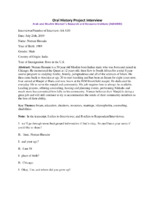 Interview Noman Hussain is a 30 year old Muslim born Indian male who was born and raised in Chicago. He memorized the Quran at 12 years old, then flew to South Africa for a total 8 year course program to studying Arabic, history, jurisprudence and all of the sciences of Islam. He then came back to America at age 20 to start teaching and has been an Imam for eight years now, four served at Masjid al Huda and now four+ at the ISM Brookfield masjid. He dedicated his everyday life to serve the masjid and community. His job requires him to always be available. Leading prayers, offering counseling, hosting and planning events, performing Nikkahs and much more has committed him fully to his community. Noman believes their Masjid is doing a great job and will still continue to try to accommodate the needs of their community members to the best of their ability.
Interview Noman Hussain is a 30 year old Muslim born Indian male who was born and raised in Chicago. He memorized the Quran at 12 years old, then flew to South Africa for a total 8 year course program to studying Arabic, history, jurisprudence and all of the sciences of Islam. He then came back to America at age 20 to start teaching and has been an Imam for eight years now, four served at Masjid al Huda and now four+ at the ISM Brookfield masjid. He dedicated his everyday life to serve the masjid and community. His job requires him to always be available. Leading prayers, offering counseling, hosting and planning events, performing Nikkahs and much more has committed him fully to his community. Noman believes their Masjid is doing a great job and will still continue to try to accommodate the needs of their community members to the best of their ability. -
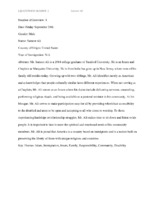 Interview Mr. Sameer Ali is a 2014 college graduate of Stanford University. He is an Imam and Chaplain at Marquette University. He is from India but grew up in New Jersey where most of his family still resides today. Growing up with two siblings, Mr. Ali identifies mostly as American and acknowledges that people culturally similar have different experiences. When not serving as a Chaplain, Mr. Ali serves as an Imam where his duties include delivering sermons, counseling, performing religious rituals, and being available as a pastoral minister to his community. At his Mosque, Mr. Ali serves to make participation easy for all by providing wheelchair accessibility to the disabled and aims to be open and accepting to all who come to worship. To those experiencing hardships or relationship struggles, Mr. Ali makes time to sit down and listen to his people. It is important to him to meet the spiritual and emotional needs of his community members. Mr. Ali is proud that America is a country based on immigrants and is a nation built on preserving the liberty of those with unique religions and countries.
Interview Mr. Sameer Ali is a 2014 college graduate of Stanford University. He is an Imam and Chaplain at Marquette University. He is from India but grew up in New Jersey where most of his family still resides today. Growing up with two siblings, Mr. Ali identifies mostly as American and acknowledges that people culturally similar have different experiences. When not serving as a Chaplain, Mr. Ali serves as an Imam where his duties include delivering sermons, counseling, performing religious rituals, and being available as a pastoral minister to his community. At his Mosque, Mr. Ali serves to make participation easy for all by providing wheelchair accessibility to the disabled and aims to be open and accepting to all who come to worship. To those experiencing hardships or relationship struggles, Mr. Ali makes time to sit down and listen to his people. It is important to him to meet the spiritual and emotional needs of his community members. Mr. Ali is proud that America is a country based on immigrants and is a nation built on preserving the liberty of those with unique religions and countries. -
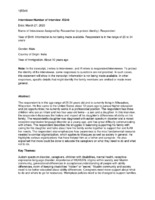 Interview The respondent is in the age range of 25-34 years old and is currently living in Milwaukee, Wisconsin. He first came to the United States about 10 years ago to pursue higher education and job opportunities; he currently works in a professional position. The respondent has three children who are an infant and two four-year-old twins – a son and a daughter. In this interview, the respondent discusses the history and impact of his daughter’s differences of ability on his family. The respondent’s daughter was diagnosed with autism spectrum disorder and a mixed receptive-expressive language disorder at a young age, and has great difficulty communicating with others. The respondent describes his struggles in balancing supporting his family with caring for his daughter and talks about how his family works together to support her and fulfill her needs. The respondent also emphasizes how awareness is the most fundamental resource needed to combat stigmatization, which applies to Mosques as well as society in general. He highlights various organizations that have helped him as a father and caregiver. He also explained that more could be done to educate the caregivers on what they need to do and what not to do.
Interview The respondent is in the age range of 25-34 years old and is currently living in Milwaukee, Wisconsin. He first came to the United States about 10 years ago to pursue higher education and job opportunities; he currently works in a professional position. The respondent has three children who are an infant and two four-year-old twins – a son and a daughter. In this interview, the respondent discusses the history and impact of his daughter’s differences of ability on his family. The respondent’s daughter was diagnosed with autism spectrum disorder and a mixed receptive-expressive language disorder at a young age, and has great difficulty communicating with others. The respondent describes his struggles in balancing supporting his family with caring for his daughter and talks about how his family works together to support her and fulfill her needs. The respondent also emphasizes how awareness is the most fundamental resource needed to combat stigmatization, which applies to Mosques as well as society in general. He highlights various organizations that have helped him as a father and caregiver. He also explained that more could be done to educate the caregivers on what they need to do and what not to do. -
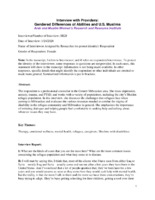 Interview The respondent is a professional counselor in the Greater Milwaukee area. She treats depression, anxiety, trauma, and PTSD, and works with a variety of populations, including the city’s Muslim refugee population. In this interview, she discusses the challenges that refugees face when coming to Milwaukee and evaluates the various resources needed to combat the stigma of disability in the refugee community and Milwaukee in general. She emphasizes the importance of initiating dialogue and helping people feel comfortable in seeking help and talking about whatever issues they may have.
Interview The respondent is a professional counselor in the Greater Milwaukee area. She treats depression, anxiety, trauma, and PTSD, and works with a variety of populations, including the city’s Muslim refugee population. In this interview, she discusses the challenges that refugees face when coming to Milwaukee and evaluates the various resources needed to combat the stigma of disability in the refugee community and Milwaukee in general. She emphasizes the importance of initiating dialogue and helping people feel comfortable in seeking help and talking about whatever issues they may have. -
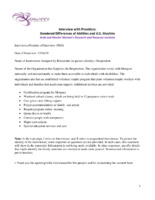 Interview The organization works with Mosques nationally and internationally to make them accessible to individuals with disabilities. The organization also has an established volunteer respite program that pairs volunteer respite workers with individuals and families that need extra support. Additional services are provided: • Certification program for Mosques • Weekend school classes, which are being held in 12 programs nation wide • Care givers and sibling support • Prayer accommodations so family can attend • Respite program online- training • Quran that is in braille • Connect people with interpreters • Major conventions • Special education services and care
Interview The organization works with Mosques nationally and internationally to make them accessible to individuals with disabilities. The organization also has an established volunteer respite program that pairs volunteer respite workers with individuals and families that need extra support. Additional services are provided: • Certification program for Mosques • Weekend school classes, which are being held in 12 programs nation wide • Care givers and sibling support • Prayer accommodations so family can attend • Respite program online- training • Quran that is in braille • Connect people with interpreters • Major conventions • Special education services and care
